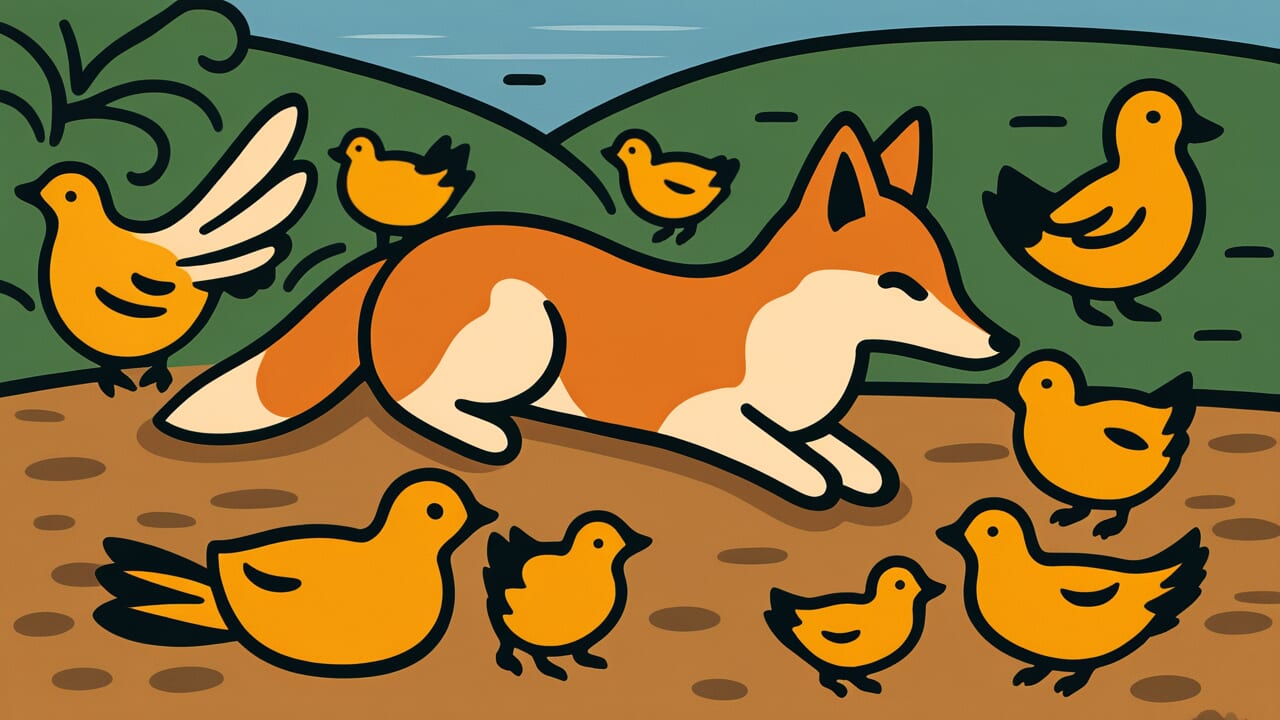How to Read “The sleeping fox catches no poultry”
The sleeping fox catches no poultry
[SLEEP-ing foks KATCH-ez no POLE-tree]
“Poultry” means chickens, ducks, and other farm birds.
Meaning of “The sleeping fox catches no poultry”
Simply put, this proverb means that if you don’t take action, you won’t achieve your goals.
The literal words paint a clear picture. A fox that’s sleeping can’t hunt chickens or other farm birds. While the fox rests, opportunities pass by. The deeper message is about the connection between effort and results. Success requires being awake, alert, and ready to act.
We use this wisdom in many areas of life today. Students who don’t study won’t pass their tests. Job seekers who don’t apply won’t get hired. Athletes who don’t practice won’t improve their skills. The saying reminds us that good things rarely come to those who wait passively.
What’s interesting about this wisdom is how it challenges wishful thinking. Many people hope success will find them without effort. This proverb cuts through that fantasy with a simple truth. The fox represents anyone with potential, but potential means nothing without action.
Origin and Etymology
The exact origin of this proverb is unknown, though it follows patterns common in European folk wisdom. Many cultures created sayings that used animal behavior to teach human lessons. The fox appears in countless proverbs because people observed its hunting skills and cunning nature.
This type of saying became popular when most people lived on farms. Everyone understood how foxes threatened chicken coops and other poultry. Farmers knew that foxes were skilled hunters when active and alert. The contrast between a sleeping fox and a hunting fox made perfect sense to rural communities.
Folk wisdom like this spread through oral tradition before being written down. Proverbs traveled from village to village through storytellers and travelers. Over time, the exact wording changed, but the core message remained the same. The saying eventually appeared in collections of English proverbs during later centuries.
Interesting Facts
The word “poultry” comes from the French word “poulet,” meaning young chicken. It entered English during the medieval period when French influenced the language. The term expanded to include all domesticated birds raised for food.
Foxes are actually crepuscular hunters, meaning they’re most active at dawn and dusk. This makes the proverb scientifically accurate – a truly sleeping fox would miss prime hunting opportunities.
Usage Examples
- Coach to player: “You can’t expect to make the team if you skip practice – the sleeping fox catches no poultry.”
- Manager to employee: “That promotion won’t come from just showing up late every day – the sleeping fox catches no poultry.”
Universal Wisdom
This proverb reveals a fundamental tension in human nature between comfort and achievement. Our brains are wired to conserve energy whenever possible, a trait that helped our ancestors survive harsh conditions. Yet this same tendency toward rest can become our greatest obstacle when opportunities require immediate action.
The sleeping fox represents more than simple laziness. It symbolizes the human tendency to assume that good things will happen automatically. We often fall into mental sleep, believing our talents alone guarantee success. This cognitive bias makes us overestimate our natural abilities while underestimating the effort required to use them effectively.
What makes this wisdom universally relevant is how it addresses the gap between potential and reality. Every generation discovers that having skills means nothing without applying them. The fox has all the tools needed for successful hunting, but those tools become worthless during sleep. Similarly, humans can possess intelligence, creativity, and opportunity, yet achieve nothing without sustained effort. This proverb endures because it confronts a comfortable lie we tell ourselves about how success actually works.
When AI Hears This
Success requires two completely different types of effort that never happen together. Most people prepare when they feel motivated and act when opportunities appear. But real achievement demands staying ready during long, empty periods of waiting. The fox must remain alert through countless boring nights before prey finally shows up.
Humans quit pursuits because they misunderstand this timing gap completely. We expect effort and reward to happen close together in time. When weeks pass without results, we assume we’re failing or wasting time. But the fox knows that ninety-nine percent of hunting is just staying awake. The actual catch happens in seconds after hours of patient watching.
This split between preparation and payoff creates something beautiful in human nature. We must hold two opposite states of mind at once. Part of us stays calm and patient during the long wait. Another part stays ready to move instantly when the moment comes. Most animals can’t handle this mental complexity, but humans do it naturally.
Lessons for Today
Living with this wisdom means recognizing when we’re in “sleeping fox” mode. Sometimes we avoid action because we fear failure or rejection. Other times we procrastinate because tasks seem overwhelming. The key insight is that small, consistent actions often matter more than perfect timing or ideal conditions.
In relationships and teamwork, this wisdom applies to everyone involved. One person’s inactivity can affect the whole group’s success. When team members stay mentally asleep, opportunities slip away from everyone. The most effective groups have people who stay alert to possibilities and ready to act when chances arise.
On a larger scale, this principle shapes how communities and organizations thrive or decline. Societies that encourage active participation tend to prosper. Those that become passive often fall behind. The sleeping fox reminds us that collective success depends on individual alertness and effort.
The challenge isn’t becoming hyperactive or anxious about every opportunity. Instead, it’s developing the awareness to recognize when action is needed and the courage to take that action. Even small steps forward beat the most comfortable inactivity.



Comments